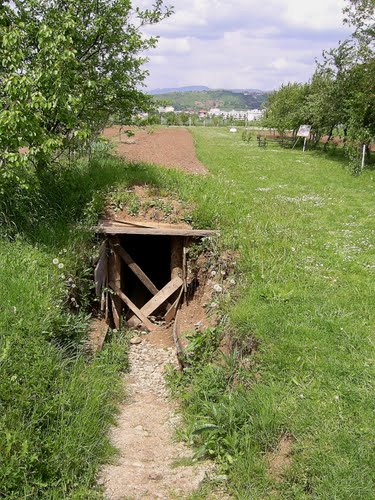
During the Bosnia conflict, reporters in Sarajevo kept quiet about at least two great stories. We did so with an unwritten rule of realizing that sometimes silence is more important than scoops.
The first was most of U.S. knew ABOUT the existence of a tunnel from Sarajevo to beyond the lines that had the city mostly surrounded. That tunnel, built in about four months, brought in supplies and aid and let some people enter and leave the city with minimal risk.
Writing about it during the war would have exposed the operation and caused it to be closed. To the best of my knowledge, no one wrote about it during the war, since the 800-meter tunnel to Butmir remained opened. The later dubbed “Tunnel of Hope” is now a much-cherished visitors’ tour.
http://www.neatorama.com/2013/04/05/The-Tunnel-That-Saved-Bosnia/
The other story kept secret was how the synagogue in Sarajevo certified many non-Jews as Jews in order to let them pass through the lines – above ground — out of the city. As the rabbi told me and others with a smile when we in the news finally did that story, it was the only time he could recall when Jews were not blamed for a war and that they were given passage without harm. Indeed, the Bosnian war was one of the few European ethnic conflicts of the 20th century that did not target the Jewish community. Even the propaganda that preceded the ethno-religious conflict did not reference Jews or the Jewish community. As the animosity among the Serbs, Croats and the Bosnian intensified, Jews were left in a unique position. Independent from each of the warring factions — they were even offered an opportunity to leave Sarajevo at the beginning of the siege of the city — the Jewish community had access to food, medical supplies and other goods that were unavailable to the rest of the population during the war.
A look at the numbers of Jews in Sarajevo before the war – compared to the number of “Jews” who left the city – is a staggering difference. The ruse was clever and effective.
And of course, writing about it would have brought it to an abrupt end and harmed many, much like writing about the tunnel.
Were we correct in our judgment? Did not writing those stories cause harm?
I think they were the correct decisions. Those past moments from Bosnia come to mind with the stories now of how the Islamic cultural treasures of Timbuktu called for the same caution and awareness for reporters. They got to a dangerous area, were accurate and fearless work in their reporting. Yet in the cases of the Timbuktu treasures, they opted to keep a secret over a scoop.
It is tough not to shout out good news. For Timbuktu, it is a name that conjures mystical romantic notions – a name once used to describe a far-away, mystical location. Indeed, it was once near impossible for outsiders to reach Timbuktu, and that added to its mystique.
During the 14th century, the legend of Timbuktu as a rich cultural center spread throughout the world. The beginning of the legend can be traced to 1324, when the Emperor of Mali made his pilgrimage to Mecca via Cairo. In Cairo, the merchants and traders were impressed by the amount of gold carried by the emperor, who claimed that the gold was from Timbuktu. Furthermore, in 1354 the great Muslim explorer Ibn Batuta wrote of his visit to Timbuktu and told of the wealth and gold of the region.
http://geography.about.com/cs/worldfacts/a/timbuktu.htm
The legend grew. In 1824, the Geographical Society of Paris offered a reward of 7,000 francs and a gold metal valued at 2,000 francs to the first European who could visit Timbuktu and return to tell their story of the mythical city. Even after the invention of air travel, the Sahara was unyielding. The plane making the inaugural air flight from Algiers to Timbuktu in 1920 was lost.
In 1988, Timbuktu was designated a United Nations World Heritage Site and efforts began to preserve and protect the city, especially its centuries-old mosques.
And it was during that time that the roots of today’s story were planted. The Sankore University was established around the Great mosque. Scholars came and wrote, and the scholarly works that were written – and under threat – were created.
The priceless manuscripts were saved from the savage fanaticism of the Islamic extremists, avoiding the fate of the huge Buddha statues that were destroyed by the Taliban in Afghanistan. Those who knew of the plan stayed mum, again concluding that silence on a sensational story was better served than a scoop at the moment of knowledge.
These treasures to humanity were saved, and the story was written today after they were saved, despite the plan being known.
Now there is a new threat to manuscripts. Humidity and mildew are threatening the fragile nature of the writings – what saved them before had saved them in many ways. Now, other outside elements are working to destroy them.
http://www.cnn.com/2013/05/28/world/africa/timbuktu-manuscripts/index.html
This occasion is the time it to write about it now before it is too late. So reporters are.
And for those looking for symbiosis in such decisions, during that aforementioned Bosnia conflict another treasure — the Sarajevo Haggadah – was hidden with much false speculation fed to the media as to its whereabouts. The manuscript survived in an underground bank vault, a fact not revealed until after the war. Throughout the war, various stories as its location, its destruction and its unknown status were floated in the media. Sometimes even reporters have to be kept in the dark.
(Photo credit: Panoramio )